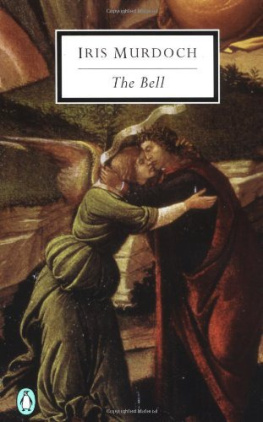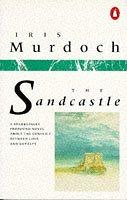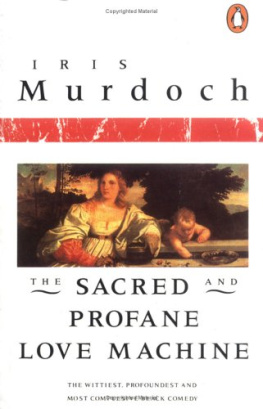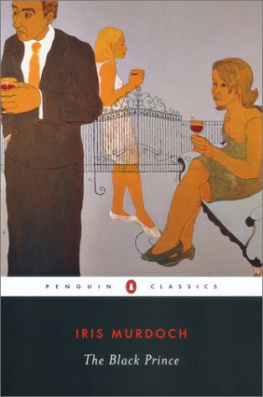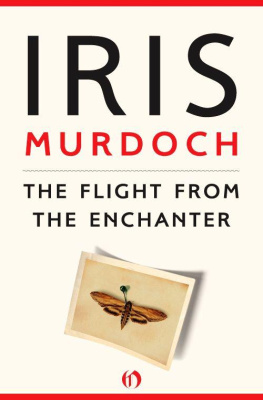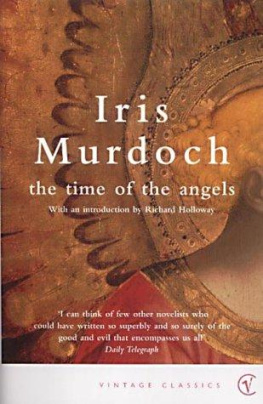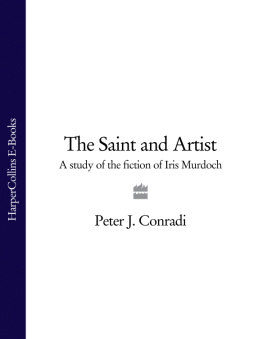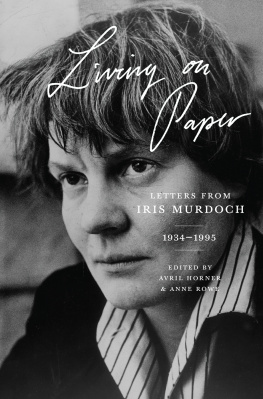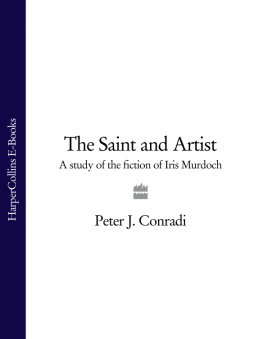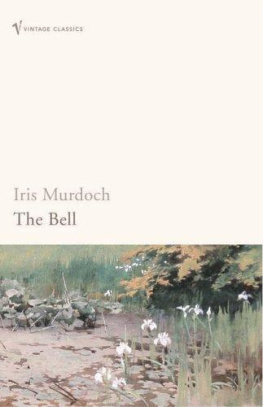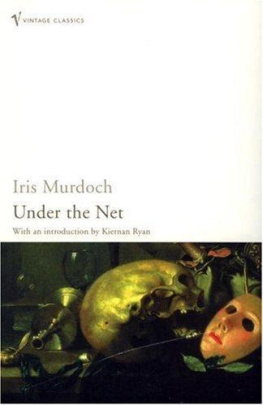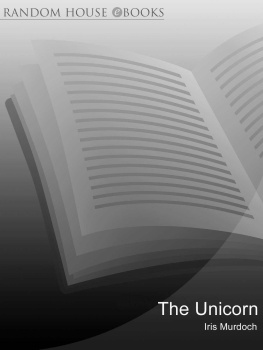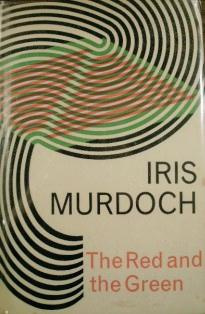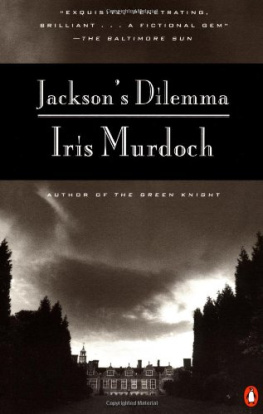
Iris Murdoch
The Sea, the Sea
Copyright Iris Murdoch, 1978
Introduction copyright Mary Kinzie, 2001
INTRODUCTION: THE DANCE OF CREATION
In his portrait from the mid-1980s entitled Dame Iris Murdoch Tom Phillips painted the novelist looking out to her right toward the light that falls on her strong, pale face, high Mongol-looking cheekbones, and unsmiling mouth. Murdochs hair, as always roughly chopped, looks unattended to; her collar is awry. (One wrinkle in its cloth-a subtle touch-resembles a tendon in the neck.) Her expression is at once mournful and calm. A profound alertness and unflinching quality is created by the almost sweet set of the mouth and the indirect gaze, so unlike the many photographs in which she relentlessly glares out at us-the 1981 portrait by Snowdon, for example, a photo that relishes also the rumpled bulk of the body in a poorly buttoned coat. But the size and disarray of self are not the focus of the image painted by Phillips. The light draws the sitters gaze, falling on the broad planes of her face-and on a corner of the painting on the wall behind her. This is the horrifying and majestic late painting by Titian of The Flaying of Marsyas. The light in this painting also comes from the upper left. A further mysterious link is that Murdochs head obscures the head of Marsyas.
In Titians painting, the satyr Marsyas is hung upside down, his goatish legs lashed to a trees branches as if in a long, tense stride. Bound at the wrists, his arms rest bent on the ground, framing his head. Near this suffering, shadowy head (the eyes open and luminous, but the mouth rucked down to the chin, as in the mask of tragedy), an ugly lapdog is licking up blood fallen from the long torso. The god Apollo, whom we also see, down to the left, in Phillipss painting, is wielding the knife that has just begun to flay the skin from the living Marsyass body. Titians radiant blond Apollo is kneeling and intent-Robert Hughes calls him prim, but perhaps it is more accurate to say that Apollo is completely absorbed, for it is his task to extract the true soul, however painfully, out of the husk of even a very beautiful body. As he does so (in fact), he must aim to make the materially beautiful seem like a husk. Rather than being primarily an allegory of the mortal artist punished for hubris by a divine one (Marsyas was tricked into admitting he believed his reed flute might rival Apollos lyre), Marsyas represents for Murdoch, as he clearly did for Titian, the pain of yearning endured and terror faced in the ordeal of creation. The artist is being remade with a new kind of beauty as we watch the painting, and a new definition of heroism is born out of this unbearable unselving.
Murdochs Bradley Pearson, the narrator and protagonist of The Black Prince (1973), explains how this unselving works in the artwork he is most drawn by:
Hamlet is words, and so is Hamlet He is the tormented empty sinful consciousness of man seared by the bright light of art, the gods flayed victim dancing the dance of creation.
The late Elizabeth Dipple, a Renaissance scholar attracted to Murdoch because of the novelists Shakespearean variety and seriousness, has properly identified the source of the dance: That Shakespeare is Marsyas, writes Dipple, flayed, suffering, defeated, dead to the self (drawn out of himself as his skin flaps to the wind) is Murdochs image of the genuine artist. The identification between Marsyas and the artist is made in Tom Phillipss painting by the placement of Murdochs face over the suffering satyrs. But what are we to make of the preternaturally gentle expression on Murdochs face? Surely this is not the artist as masochist? Is Shakespeare a masochist? Of course, Bradley Pearson insists.
He is the king of masochists, his writing thrills with that secret. But because his god is a real god and not an eidolon of private fantasy, and because love has here invented language as if for the first time, he can change pain into pure poetry He enacts the purification of speech, and yet this is also something comic Shakespeare cries out in agony, he writhes, he dances, he laughs, he shrieks, and he makes us laugh and shriek ourselves out of hell What redeems us is that speech is ultimately divine.
Shakespeare endures the tortures of imperfection yet renders them in intelligent plots, careful placement of character, and sublime and various language. He is both the delver into the coils of self and the perspective taken by art above self. (To be Apollo is beyond even the great artists ability; his is an unearthly music.) All one can do is hope to endure the pain that comes with creation. Furthermore, Marsyas as the type of the artist is being both defeated and redeemed. His rescue takes him out of the husk of a lower form and into a higher. By Titians time he had come to represent a religious metamorphosis that might be granted to the painter or poet: Enter my breast, Dante had written, and infuse me with your spirit as you did when you tore Marsyas from the covering of his limbs (Paradiso I.19-20). The gods act creates the conditions for a passage into a form of being one does not know about yet.
When we ask why Murdoch so identified herself with this painting as to return to it in her work and to elect it as the background for her portrait, we might conjecture that Marsyas represents the major artistic paradox of the physical being on the threshold of a spiritual change. The figure of Marsyas is blazing with life, although clearly linked to a satyrs lower, animal nature. (He is a flawed entity, not entirely human as yet.) Moreover, he is suffering, for this is also part of the artists task. He is submitting in terror, yet without struggle, to having the real rind of his symbolically flawed nature sliced away. The process is only just beginning in the painting-it will take a long time before he dies to the flesh. The self released from this body is implicitly linked to the beauty of the kneeling Apollo and to the youth Olympus in the background, a former follower of Marsyas who now plays the viola da braccio, Titians version of Apollos lyre. To these figures Marsyas is linked by contrast (his pan pipes hang from the branch by his hoof), but also by the promise that in his change, through unspeakable striving, he might aspire to mingle with mind, spirit, and wordless nonnarrative formal perfection.
Murdoch believed that the threefold task of the novelist was to see ourselves not as romantically separate beings but in the context of the world about us (Civilization is terrible, one character writes to the protagonist in The Sea, the Sea, but dont imagine that you can ever escape it), then to witness ourselves through the ordeal of an introspection that must be painful to our human natures, bent as we are on self-satisfaction, and finally to intuit patterns emerging from random necessity, chaos, confusion, rubble-the wandering causes with which the demiurge must work in making the world. Murdoch extends the idea of external chaos to the internal realm: To be an artist means working against-as well as working with-the miserable nonsense that fate and accident make of our lives, no less than the nonsense our own foreshortened insight makes of the patterns in which we are embroiled. To see misery and evil justly, Murdoch writes in The Fire and the Sun (1976), is one of the heights of aesthetic endeavor:
How this becomes beautiful is a mystery Shakespeare makes not only splendour but beauty out of the malevolence of Iago and the intolerable death of Cordelia, as Homer does out of the miseries of a pointless war and the stylish ruthlessness of Achilles.
Next page

